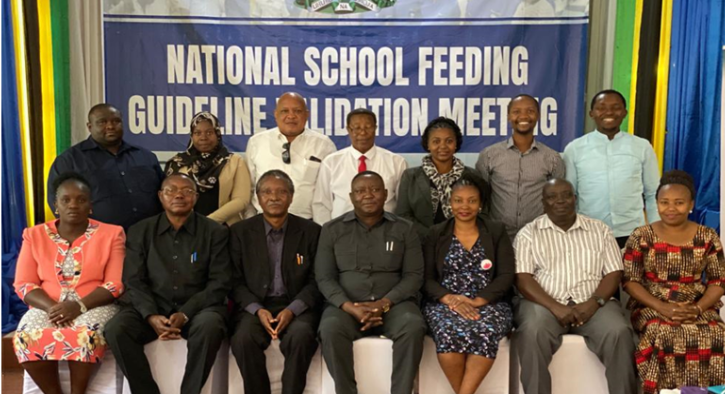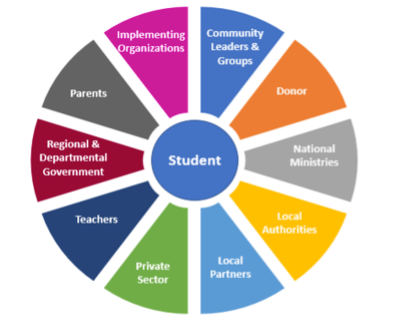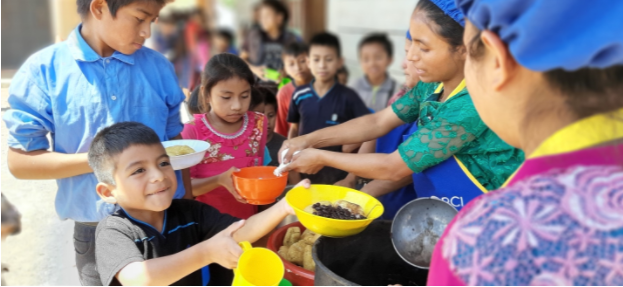Featured photo: Primary school students receiving a nutritious, daily school meal with USDA donated commodities from PCI’s McGovern-Dole project in Huehuetenango, Guatemala and commodities purchased by PTAs with funds from Guatemala’s Ministry of Education. Photo Credit: Project Concern International, a Global Communities Partner
Written by Stephanie Gaffney, Technical Advisor for Integrated School Feeding and Sustainable Programming at PCI, a Global Communities Partner, with contributions from Dr. Jennifer Simpson, Senior Technical Advisor for Monitoring, Evaluation, Research and Learning at PCI, a Global Communities Partner. All photos taken prior to COVID-19 pandemic.
Project Concern International (PCI), a Global Communities Partner, targets the most vulnerable populations to collectively identify and execute resilient solutions for enhanced food security and nutrition, bringing lasting benefits to the entire community. Through PCI’s U.S. Department of Agriculture (USDA) funded McGovern-Dole International Food for Education and Child Nutrition (McGovern-Dole) and Local and Regional Food Aid Procurement (LRP) projects, students receive a daily, nutritious school meal; smallholder farmers have greater access to market opportunities; the growing farm production enhances the local economy and household food security; and strengthened national school feeding programs are sustaining improved education, health, and nutrition outcomes for children.
PCI’s LRP project in Guatemala, called Nuestra Cosecha, has had a profound impact on Maria Jacinto, a widow who turned to farming to support her 4-month-old daughter and 5-year-old son when her husband was killed in bus accident 13 years ago. PCI recruited her at the local market to join Nuestra Cosecha, which helps smallholder farmers become local suppliers to primary schools in their community. On the quarter of an acre Maria Jacinto owns in the Western Highlands, she now contributes nearly 50% of the food going to seven schools in Santa Eulalia. Since then, she has sold 5.6 tons of food to schools with a value of $6,500 and has hired workers and expanded her farm.
“I’ve been saving money and buying plots little by little,” she said. “I don’t want to do anything else but this. I love farming.” When asked what it is about working the land that fuels her passion, Jacinto smiled at the seedling in her hand and then pointed to a field ripe for harvest in the distance. “Transformation,” she said. “To see this become that.”
Despite the devasting and ongoing impact of COVID-19, forcing schools to close for over a year in Guatemala, PCI continued to partner with various actors at all levels to adapt implementation and ensure the integrated school feeding projects continued to benefit students and communities. The fresh produce purchased from local suppliers under the LRP project (vegetables, fruits, eggs) that complements foods procured by schools with Ministry of Education (MoE) funds and food provided by PCI’s McGovern-Dole project (rice, beans, vegetable oil, CSB+) now reaches students as take-home rations. María Gaspar, a PTA leader at a Nuestra Cosecha supported school, shared the importance of partnership between USDA, PCI, Guatemala’s MoE, local suppliers, communities, and schools to continue to support their children’s education and nutrition outcomes.
“I am happy and joyful to receive these bags of vegetables,” she said. “I was keeping an eye out to make sure the products received were good quality. It was a good thing that PCI delivered the products together with those distributed by the Ministry of Education. Even though the school is closed, children will be able to eat. This will help their education.”
Donors, implementing organizations, and project stakeholders all agree on the importance of creating resilient pathways for lasting impact and sustained benefits. Additionally, there is a growing evidence base evaluating successful transitions post-project, including post-project sustainability studies conducted by PCI. However, there remains limited evidence on how to measure progress toward a successful transition or guidance on how to operationalize transition plans that can be applied across varying contexts. So how do we know if we’re on the right path now to ensure communities continue to benefit after the project ends?
PCI designs each project with a gradual transition approach and embeds a sustainability lens throughout the entire project lifecycle. PCI has recognized the need for tools and processes to monitor progress toward sustainability during the project implementation period. PCI has also created definitions and tools that can be adapted across countries and projects to measure sustainability readiness, or the degree of stakeholders’ preparedness achieved within a project period to increase the likelihood of sustained impact beyond the life of the project.
These planning and measurement tools and approaches were adapted to PCI’s three current USDA-funded McGovern-Dole projects in Tanzania, Guatemala, and Nicaragua, in a manner tailored to their unique operational contexts. USDA prioritizes sustainability and commits long-term investment to support programs in reducing poverty and food insecurity in vulnerable populations and pave the path for local governments and communities to become self-sufficient and sustain benefits of students’ improved literacy, health, and nutrition after the funding period ends.

Following application of tools and approaches in each of the three McGovern-Dole programs, PCI conducted case studies to analyze each project’s sustainability readiness assessment results, progress in transition plans, and document lessons learned and various adaptations taken to determine what enabled, or hindered, the transition toward local ownership. We found that it is important for all project stakeholders to have equal voice and responsibility as partners together, to create, execute, and monitor progress toward a shared vision for sustained impact. Analysis of PCI’s sustainability readiness checklist results showed improvements from 2017 to 2019, with a positive trend in the handover of essential activities and services from PCI to local government and community actors.
PCI’s McGovern-Dole projects have all achieved major milestones at national and sub-national levels to transition to locally owned school feeding programs and sustain benefits to students’ education and nutrition. In Tanzania, PCI partnered with the MoE and Ministry of Health to develop the first National School Feeding Guideline, National School Health Guide and Manual, and National School Library Guideline. In Guatemala, all six municipalities supported with PCI’s McGovern-Dole project have developed municipal policies to support children’s education and nutrition with budget lines to support school feeding programs and supplement funds from the MoE provided under the National School Feeding Law. In Nicaragua, PCI’s transition plan gradually shifts away from USDA donated commodities, whereby the MoE progressively increases the commodities procured and distributed to schools under the National School Feeding Program.
Through active stakeholder engagement, community mobilization, capacity strengthening, and networking events, PCI facilitates the linkages across the various actors to support an integrated system and partnership that puts the student at the center. In Tanzania, PCI partners with government officials across ministries to conduct joint monitoring visits to monitor progress, identify gaps, and create action plans for improvement. Through a partnership with a University in Guatemala and the MoE, 183 teachers received a University Diploma in writing and reading skills in bilingual and intercultural contexts. Capacity strengthening of first to third grade teachers acquired new skills for literacy instruction in Spanish and local Mayan languages, which are now being scaled by the government across primary schools outside of PCI’s McGovern-Dole supported schools. In Nicaragua, PCI facilitates participatory evaluations and visioning activities for communities to create their “dream school” and make the school a priority in their community. Each school developed a community school action plan and self-monitors sustainability readiness.

“Now we are the guarantors of the processes. PCI showed us the way; now we can continue without your help.”
– Parent and School Community Support Group member supported by PCI’s McGovern-Dole project in Nicaragua
Recommendations:
- Embed a Sustainability Lens throughout the Project Lifecycle: Do not wait until the end of the project to begin transition. Sustainability planning starts at the program design and must be maintained and updated throughout the project lifecycle.
- Create a Shared Vision for Enhanced Ownership by All Actors: At project conception, involve all actors to create action plans to achieve what sustainability means for them. This should not be donor or organization driven, but a facilitated process to bring in all voices.
- Measure Progress toward Sustainability Readiness: Using participatory methods, track progress throughout the project lifecycle and use results to adapt and tailor support to meet the needs of all stakeholders for enhances sustainability readiness.
- Implement Holistic and Integrated Programming: Integrated programming requires multiple actors at multiple levels to work together as an integrated system to achieve sustained benefits centered around students.
Commit to Long-term Investment for a Gradual Transition: Resilient and sustainable development takes long-term investment and commitment from donors to prioritize a gradual transition for lasting impact.


